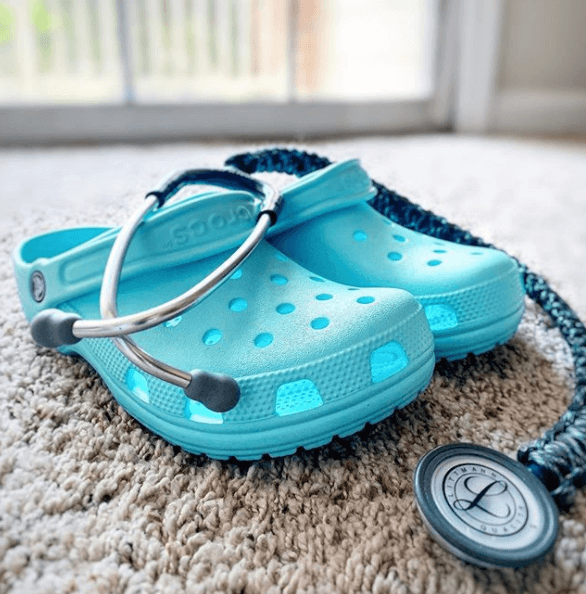
GEF earmarks $204.3 m to help UNDP scale up efforts for climate resilient future
The Global Environment Facility (GEF) has just approved $204.3 million for the United Nations Development ...

Crocs company has donated more than 860,000 pairs of Crocs to health care workers since the outbreak of the coronavirus pandemic in the US, Canada and Europe.
The donation falls within the framework of its “Free Pair for Healthcare” initiative.
Executives at Crocs not only saw those stressed, overwhelmed frontline workers, but also started getting requests from them for shoes to keep them going during the long hours. The company realized it had an opportunity to offer a little kindness and comfort to a group of loyal customers at a particularly challenging time. Crocs came up with an ambitious idea: to give away 10,000 pairs of shoes every day to people working on the front lines of the COVID-19 epidemic.
Crocs’ iconic foam clogs — in black and white, in lemon and mint and leopard print — arrived on the doorsteps of grateful health care workers and frontline responders, who posted messages and photos of their Crocs.
Adam Michaels, Crocs’ chief digital officer, says the company created the campaign to help as many people as possible and provide comfort where it was needed most.
“It became obvious that we have a product that a group of our consumers have been buying from us for years, and that particular group had an immediate and real need,” he says. “We thought the best way to give back was to give them the footwear they needed on the front lines of fighting COVID-19.”
Behind the scenes, the campaign was an enormous undertaking. It required building a platform that could fulfill orders, communicate with customers and handle up to 500,000 daily visitors to the site — while still maintaining enough inventory to fill orders while production was scaled back because of the pandemic.
Microsoft Teams was integral to the effort, enabling employees working remotely around the US to quickly share designs and documents, provide input and make decisions in real time without getting bogged down by email chains, Michaels says.
The campaign ramp-up, he says, was “one of the fastest turnarounds we’ve had for any project, especially of that magnitude. Teams was key to that. It allowed us to iterate so much faster than traditional channels. Doing that remotely, without Microsoft Teams, in the timeframe we had, we probably wouldn’t have been able to do it.”
Teams has been a critical tool for Crocs in other ways during the pandemic. Employees in Europe hosted a sales meeting via a live Teams event, showing and talking through the Crocs line to potential retail customers. Teams was also used to design and launch two seasons of new products, an undertaking that would typically involve flying employees from around the world to Crocs’ headquarters in Niwot, Colorado.
And regular town hall meetings on Teams have allowed employees to connect with each other and hear directly from the company’s CEO, Andrew Rees, whose dog, Cooper, sometimes makes an appearance.
Mike Feliton, Crocs’ senior vice president and chief information officer overseeing technology, chose Teams for the company’s collaboration platform because it allows users to easily work together in a shared space.
Crocs rolled out Teams in the summer of 2019, and when the pandemic hit — forcing Crocs to temporarily close most of its 360 stores — employees companywide immediately turned to Teams to connect and collaborate.
“We adopted the platform from our CEO down almost instantaneously,” Feliton says. “Teams has been central to our business.”
Feliton was so impressed with how Teams helped facilitate Crocs’ health care campaign that he sent an email to Microsoft CEO Satya Nadella, thanking him for the technology.
The pandemic also prompted Crocs to intensify the digital-first strategy it embarked on about five years ago. Recognizing that more consumers were shopping online, the company closed some stores and ramped up its marketing efforts on digital channels.
When COVID-19 hit, Crocs invested heavily with Microsoft Advertising and increased its focus on paid search to target customers who might not have previously bought Crocs online.
Company official say those efforts contributed to Crocs’ reported record third quarter revenue of $361.7 million, with digital sales up 35.5.%.
Crocs has shifted almost all its operations to Microsoft Azure, with help from the Azure Migration Program, and is using Power BI, Microsoft’s data visualization platform, to pull together data from various sources. Now, Crocs is getting detailed data reports several times a day through Power BI.
The Global Environment Facility (GEF) has just approved $204.3 million for the United Nations Development ...
The European Bank for Reconstruction and Development (EBRD) is promoting renewable energy and low‑carbon technologies ...
Vodafone Foundation has pledged €30,000 to Save the Children in response to the devastation caused ...


اترك تعليقا